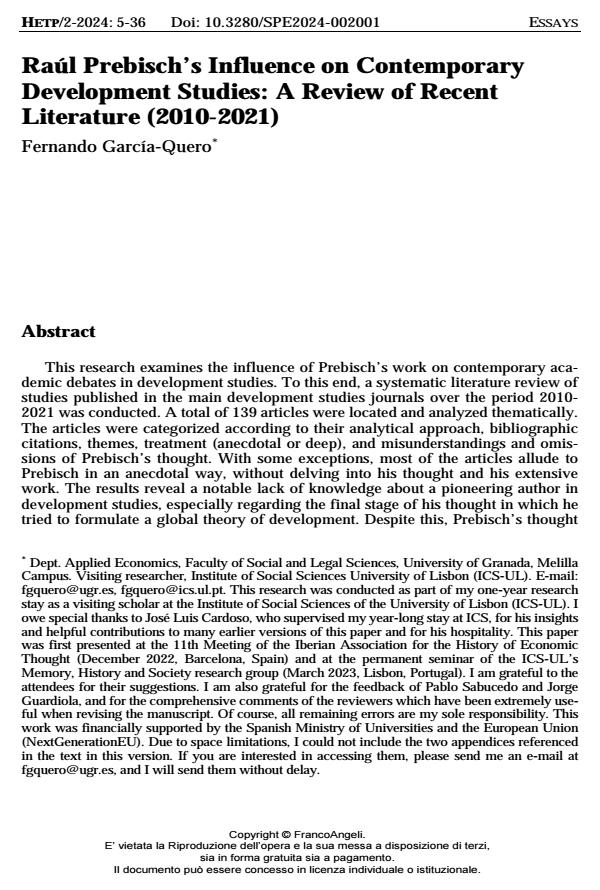Raúl Prebisch’s Influence on Contemporary Development Studies: A Review of Recent Literature (2010-2021)
Titolo Rivista HISTORY OF ECONOMIC THOUGHT AND POLICY
Autori/Curatori Fernando García-Quero
Anno di pubblicazione 2025 Fascicolo 2024/2
Lingua Inglese Numero pagine 32 P. 5-36 Dimensione file 218 KB
DOI 10.3280/SPE2024-002001
Il DOI è il codice a barre della proprietà intellettuale: per saperne di più
clicca qui
Qui sotto puoi vedere in anteprima la prima pagina di questo articolo.
Se questo articolo ti interessa, lo puoi acquistare (e scaricare in formato pdf) seguendo le facili indicazioni per acquistare il download credit. Acquista Download Credits per scaricare questo Articolo in formato PDF

FrancoAngeli è membro della Publishers International Linking Association, Inc (PILA)associazione indipendente e non profit per facilitare (attraverso i servizi tecnologici implementati da CrossRef.org) l’accesso degli studiosi ai contenuti digitali nelle pubblicazioni professionali e scientifiche
This research examines the influence of Prebisch’s work on contemporary academic debates in development studies. To this end, a systematic literature review of studies published in the main development studies journals over the period 20102021 was conducted. A total of 139 articles were located and analyzed thematically. The articles were categorized according to their analytical approach, bibliographic citations, themes, treatment (anecdotal or deep), and misunderstandings and omissions of Prebisch’s thought. With some exceptions, most of the articles allude to Prebisch in an anecdotal way, without delving into his thought and his extensive work. The results reveal a notable lack of knowledge about a pioneering author in development studies, especially regarding the final stage of his thought in which he tried to formulate a global theory of development. Despite this, Prebisch’s thought connects with lines of research at the frontier of knowledge on the entrepreneurial state, ecologically unequal exchange, or post-extractivisms. A research and political agenda focused on his legacy requires placing at the center of the development debate issues such as the social use of surplus, the concentration of means of production, technological progress, industrialization, environmental challenges and, above all, the ethics of development.
Parole chiave:pioneers of development, peripheral capitalism, highest impact journals, ECLAC
Jel codes:B20, O10, N16
- Repensando las transiciones desde el Sur Eduardo Gudynas, Fernando García-Quero, in Desenvolvimento e Meio Ambiente /2025 pp.464
DOI: 10.5380/dma.v66i.99113
Fernando García-Quero, Raúl Prebisch’s Influence on Contemporary Development Studies: A Review of Recent Literature (2010-2021) in "HISTORY OF ECONOMIC THOUGHT AND POLICY" 2/2024, pp 5-36, DOI: 10.3280/SPE2024-002001